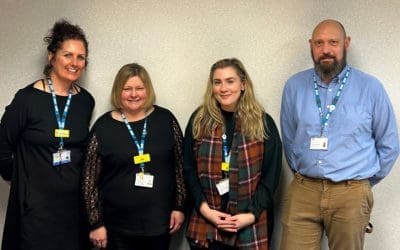As part of the national programme of Community Mental Health Transformation, we are introducing a small grant offer to Voluntary, Community and Social Enterprise (VCSE) organisations providing services within Gloucestershire.
The Community Mental Health Transformation programme of work is supporting adults within Gloucestershire who are experiencing Severe Mental Illness (SMI) to take better care of both their physical and mental wellbeing and complex emotional needs.
SMI refers to people with psychological problems that are often so severe that they are not able to engage in activities that many people take for granted. It includes (but is not limited to) conditions such as schizophrenia, and bipolar disorder, or psychosis.
Grants are available to support small scale projects that aim to improve the lives and experience of people with a serious mental illness within Gloucestershire. All successful organisations should be able to demonstrate their exclusive impact on this cohort of service users. The closing date for grant applications is 31 October 2023.
Structure
The small grant fund is delivered as a partnership between Gloucestershire Health and Care NHS Foundation Trust and Gloucestershire VCS Alliance. Financial responsibility for the grant fund remains the responsibility of Gloucestershire Health and Care NHS Foundation Trust.
Programme Principles
In line with the transformation framework, we are prioritising funding for VCSE organisations who can demonstrate a deep working with people with lived experience and all organisations need to demonstrate how they will support Gloucestershire’s Transformation Principles:
- Being service user centred
- Being transformative when designing new locality and community-based services
- Involving a diverse range of service users with serious mental illness
Fund Objective and Principles
The overarching aim of the fund is to support community-based initiatives that promote and develop good mental health and wellbeing and / or mitigate and protect against the impact of serious mental illness within the adult population in Gloucestershire with a particular focus on projects that fit with the following principles:
- Projects which tackle crisis support, social isolation and loneliness, prevention, and early intervention
- Addressing the mental health inequalities and the needs of a range of at-risk groups
- Improve accessibility to mental health projects/services e.g., through transport/outreach in local communities
- Improve connectivity of community services across locality
- Supporting small ‘grass roots’ community groups and organisations to deliver such activities
- Focus on people who need more support than primary care is able to offer, but do not meet the criteria for secondary care mental health services
- Demonstrate high levels of co-production and engagement with people with lived experience to develop a clear point of view about their needs, barriers which may prevent them from accessing services and any service development needed
- Promote a strengths-based approach and support the strengths and aspirations of individuals
- Providing opportunities for people to connect with each other, build trusted relationships and revitalise communities
- Deliver peer support for people with mental health needs
- Supporting recovery locally by building on what is already there, and by investing in creative solutions
- Supporting knowledge, learning, education, and training
- Collaborations and partnership working between organisations are permitted and encouraged.
Target Groups
Improve accessibility to service users who may have previously been disenfranchised or had limited access to statutory and community mental health services. To work with service users from underserved backgrounds or groups, to help them engage with mental health statutory services and develop community support plans where required. Focus is primarily on the following areas: ethnically diverse people, and LGBTQ+, and male service users and those living in areas of high deprivation and rural communities.
See below sub-project scope definitions for the following SMI cohorts:
Ethnically Diverse Communities
To improve engagement and trust in the community and statutory mental health services for SMI service users from ethnically diverse communities within Gloucestershire. We understand that there is a link between health inequalities and ethnicity, often leading to ethnically diverse people having poor health outcomes when compared to the general population. There is also evidence that members of ethnic minorities have a higher prevalence of SMI in the UK and struggle to access services in a way that is meaningful to them. We want to understand what prevents high levels of engagement and inclusion and develop projects which will both help staff within health provide a better service for this cohort and support service users to engage in and access services to help them live well in their communities.
LGBTQ+
To improve engagement and trust in community and statutory mental health services for LGBTQ+ Service Users with SMI. To understand what prevents high levels of engagement and inclusion. Develop projects which will both help staff within health provide a better service for these service users and help service users engage in and access services to help them live well in their communities.
Male Service Users
To improve engagement and trust in the community and statutory mental health services for adult male SMI service users within Gloucestershire. Although mental health problems and SMI affect both men and women, we see significantly higher rates of suicide in men. They are also less likely to access psychological therapies, they have increased levels of homelessness and substance abuse and are more likely to be victims of violence and end up detained (sectioned). We want to understand what prevents high levels of engagement and inclusion and develop projects which will both help staff within health provide a better service for this cohort and support service users to engage in and access services to help them live well in their communities.
High Deprivation Communities
To improve engagement and trust in the community and statutory mental health services for SMI service users who also live in high areas of deprivation within Gloucestershire, whether city or rural areas. We know that within Gloucestershire health inequalities exists and we have underserved areas. This not only impacts the general population within these areas, but significantly adversely impacts service users with SMI. Such health inequalities lead to poorer health outcomes for a cohort that already experiences a lower life expectancy when compared to the general population. Throughout the health system inequalities exist in: –
- Socio-economic and environmental factors, including income, employment, housing, occupation, and education.
- Lifestyle and health behaviours such as smoking, diet, alcohol intake and levels of physical activity.
We want to understand what prevents high levels of engagement and inclusion for this cohort and develop projects which will both help staff within health provide a better service for this cohort and support service users to engage in and access services to help them live well in their communities.
FINANCE AND CRITERIA
We have a fixed budget of £100,000 for this work for the period 2023/2024. The Small Grant Fund enables organisations to apply for funding from £1,000 up to a maximum of £10,000, starting no later than March 2023 and completing within 12 months. Four grants of £10,000 will be available and the additional £60,000 will be allocated to bids from £1,000 up to £10,000. Funds will be offered equitably across all districts of Gloucestershire to support the six Locality Community Partnerships based around the current Gloucestershire Integrated Locality Partnerships of GP practices.
Who can apply to the fund?
This is a grants fund is specifically for *Gloucestershire based voluntary, community or social enterprise (VCSE) sector organisations. Priority will be given for organisations that have a depth of knowledge and track record of working in one or more locality. *Definition of Gloucestershire-based: organisations that have offices in Gloucestershire OR have a track record of delivering activities for Gloucestershire residents.
Eligible Costs
- Equipment Costs
- Capital costs
- Training costs
- Project costs
- Event costs
- Revenue/ staff costs
Ineligible Costs
This fund will not offer support for the following costs;
- Funding towards religious projects that promote religion (although religious organisations can be funded for non -religious projects)
- Should funding be used to support the recruitment of any substantive posts then the liability and obligation to source funding for these roles (and/or any associated redundancy/liability costs) sit with the respective organisation.
How to apply or ask questions
You can request a printed application form, a full copy of the application criteria and ask questions by emailing smallgrants.enquiries@ghc.nhs.uk. You can also complete an online application form here: https://forms.office.com/e/hRte0ypvQT
A word version of the application form is here: APPLICATION FOR GRANT FUNDING FROM GLOUCESTERSHIRE CMHT Small Grants 2024 – Version 2.1 (2)
Award structure
A panel of GHC contracts and finance, VCSE Alliance, Expert by Experience, and GHC clinical staff will compose the quorate for panel applications.
Applications (Wave 1)
Applications – Sept/Oct 2023
Panel approvals – November 2023
Award of grants and transfer of funds – December 2023
Wave 2
In the event there are any remaining funds after Wave 1, a second opportunity will open as follows:
Applications – December 2023
Panel approvals – January 2024
Award of grants and transfer of funds – February 2024
Monitoring
- Organisations will have 12 months to fully deliver their project unless agreed otherwise.
- At the end of the project, organisations will be asked to complete the end of grant impact report.
- Project outcomes must include direct feedback from people with SMI who have experienced the impact of the project.
- Specific project outcomes will be agreed as part of the grant award process.




